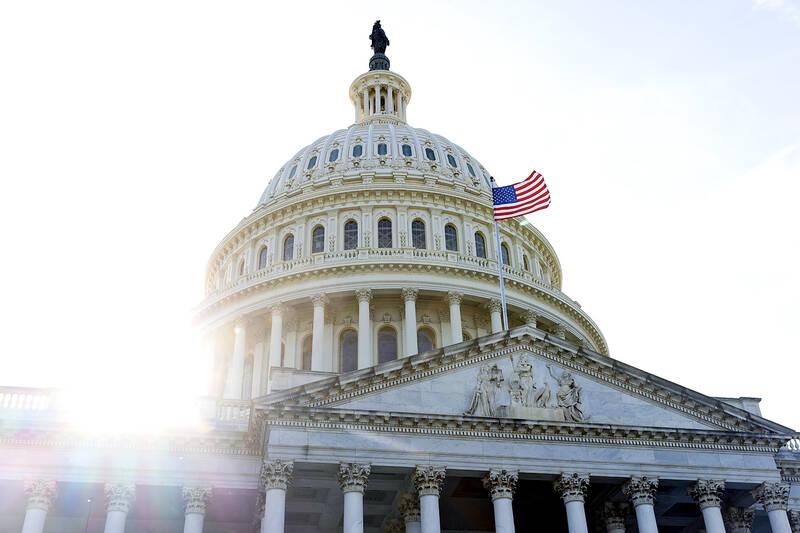US Representative Raja Krishnamoorthi plans to reintroduce the Taiwan Allies Fund Act “in the very near future,” he said in a think tank online discussion yesterday.
Krishnamoorthi, a member of the House Select Committee on the Strategic Competition Between the United States and the Chinese Communist Party (CCP), made his comments during a talk called “How Beijing lures Taiwan’s diplomatic partners into switching recognition,” hosted by the Atlantic Council.
“The US has to do everything in its power to protect Taiwan’s rightful international place. Taiwan is not just a valuable international partner, it’s a beacon of freedom and democracy too,” Krishnamoorthi said.

Photo: EPA-EFE
Through economic coercion and “opaque agreements,” China has pressured countries to switch diplomatic ties away from Taiwan, Krishnamoorthi said, specifically mentioning countries like the Solomon Islands and Nauru.
Citing the example of Nauru, which switched diplomatic recognition away from Taiwan following the 2024 presidential election, Krishnamoorthi said it demonstrates how China “punishes” Taiwan for its democratic choices.
“This cannot continue to happen until those who recognize Taiwan become zero, which is what Beijing wants,” he said.
The difference between the US and Beijing, Krishnamoorthi said, is that while China seeks to “extract,” the US works to promote “development, progress and opportunities” around the world.
The goal of the Taiwan Allies Fund Act is to support projects that deepen international security and include Taiwan in international sustainable development efforts, he said.
The bill would authorize aid to countries with official or strong unofficial relations with Taiwan, Krishnamoorthi added.
“This bill pushes against the CCP’s illegitimate claim that Taiwan cannot play a role in the international community,” he said.
The bill enables sovereign nations to make decisions free from coercion, he added.
It would be a bipartisan and bicameral bill, Krishnamoorthi said.
Last year, Krishnamoorthi and other members of the committee proposed the bipartisan bill to provide foreign assistance to countries that advance Taiwan’s participation in international bodies, counter China’s influence and propaganda or diversify supply chains away from China.
That bill would have allowed eligible countries to receive up to US$5 million (NT$165.27 million) annually from a broader Countering the People’s Republic of China Malign Influence Fund.

Chinese spouse and influencer Guan Guan’s (關關) residency permit has been revoked for repeatedly posting pro-China videos that threaten national security, the National Immigration Agency confirmed today. Guan Guan has said many controversial statements in her videos posted to Douyin (抖音), including “the red flag will soon be painted all over Taiwan” and “Taiwan is an inseparable part of China,” and expressing hope for expedited reunification. The agency last year received multiple reports alleging that Guan Guan had advocated for armed reunification. After verifying the reports, the agency last month issued a notice requiring her to appear and explain her actions. Guan

GIVE AND TAKE: Blood demand continues to rise each year, while fewer young donors are available due to the nation’s falling birthrate, a doctor said Blood donors can redeem points earned from donations to obtain limited edition Formosan black bear travel mugs, the Kaohsiung Blood Center said yesterday, as it announced a goal of stocking 20,000 units of blood prior to the Lunar New Year. The last month of the lunar year is National Blood Donation Month, when local centers seek to stockpile blood for use during the Lunar New Year holiday. The blood demand in southern Taiwan — including Tainan and Kaohsiung, as well as Chiayi, Pingtung, Penghu and Taitung counties — is about 2,000 units per day, the center said. The donation campaign aims to boost

The Kaohsiung Tourism Bureau audited six hotels in an effort to prevent price gouging ahead of Korean band BTS’ concert tour in the city scheduled for Nov. 19, 21 and 22 this year. The bureau on Friday said that the audits — conducted in response to allegations of unfair pricing posted on social media — found no wrongdoing. These establishments included the local branches of Chateau de Chine, Hotel Nikko, My Humble House, and Grand Hai Lai, it said, adding that the Consumer Protection Commission would have penalized price gougers had the accusations been substantiated. The bureau said the Tourism Development Act

BACK TO WINTER: A strong continental cold air mass would move south on Tuesday next week, bringing colder temperatures to northern and central Taiwan A tropical depression east of the Philippines could soon be upgraded to be the first tropical storm of this year, the Central Weather Administration (CWA) said yesterday, adding that the next cold air mass is forecast to arrive on Monday next week. CWA forecaster Cheng Jie-ren (鄭傑仁) said the first tropical depression of this year is over waters east of the Philippines, about 1,867km southeast of Oluanpi (鵝鑾鼻), and could strengthen into Tropical Storm Nokaen by early today. The system is moving slowly from northwest to north, and is expected to remain east of the Philippines with little chance of affecting Taiwan,